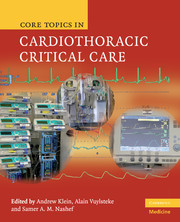Book contents
- Frontmatter
- Contents
- Contributors
- Preface
- Foreword
- Abbreviations
- SECTION 1 Admission to Critical Care
- SECTION 2 General Considerations in Cardiothoracic Critical Care
- SECTION 3 System Management in Cardiothoracic Critical Care
- SECTION 4 Procedure-Specific Care in Cardiothoracic Critical Care
- SECTION 5 Discharge and Follow-up From Cardiothoracic Critical Care
- SECTION 6 Structure and Organisation in Cardiothoracic Critical Care
- SECTION 7 Ethics, Legal Issues and Research in Cardiothoracic Critical Care
- 69 Patient's perspective
- 70 Ethical management
- 71 Medicolegal issues
- 72 Research
- Appendix Works Cited
- Index
70 - Ethical management
from SECTION 7 - Ethics, Legal Issues and Research in Cardiothoracic Critical Care
Published online by Cambridge University Press: 05 July 2014
- Frontmatter
- Contents
- Contributors
- Preface
- Foreword
- Abbreviations
- SECTION 1 Admission to Critical Care
- SECTION 2 General Considerations in Cardiothoracic Critical Care
- SECTION 3 System Management in Cardiothoracic Critical Care
- SECTION 4 Procedure-Specific Care in Cardiothoracic Critical Care
- SECTION 5 Discharge and Follow-up From Cardiothoracic Critical Care
- SECTION 6 Structure and Organisation in Cardiothoracic Critical Care
- SECTION 7 Ethics, Legal Issues and Research in Cardiothoracic Critical Care
- 69 Patient's perspective
- 70 Ethical management
- 71 Medicolegal issues
- 72 Research
- Appendix Works Cited
- Index
Summary
Introduction
Most doctors, wherever they work, subscribe to the tenets of beneficence and nonmaleficence (Primum non nocere – first do no harm). There is the desire to help, to try to heal, without doing further harm. However, critical care staff have to be ruthlessly realistic about what is possible, as opposed to what is desirable, and resist the temptation to play God. Public expectations are on the increase, particularly as new treatments and cures are announced in the media regularly. The delay in such treatments becoming mainstream is variable and the time it takes for drugs to gain their product license is often financially driven. There is the constant feeling of frustration that something that would make a seminal difference to a particular patient is just out of reach. Had they contracted their illness next year it could have been different.
Critical care, in a sense, embodies and concentrates many of the ethical issues and concerns that are prevalent but just more diluted, throughout the rest of the hospital. Because it is a highly charged place where life-and-death decisions are made on a daily basis, it is also the place where the need for professionalism is of particular importance. There is the risk, however, that the wall of professionalism becomes the barrier beyond which the carers cannot afford to go in preservation of their own emotions, feelings and often sanity.
- Type
- Chapter
- Information
- Core Topics in Cardiothoracic Critical Care , pp. 498 - 501Publisher: Cambridge University PressPrint publication year: 2008



